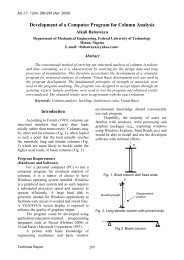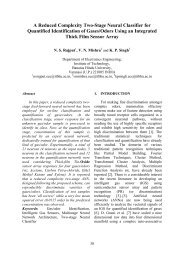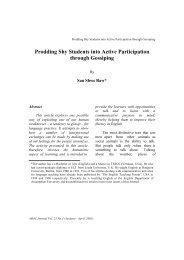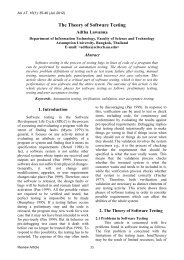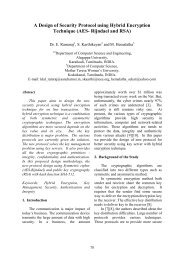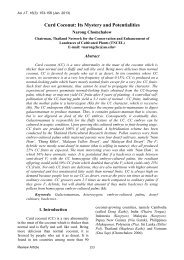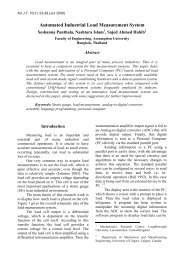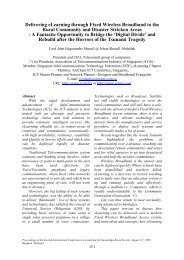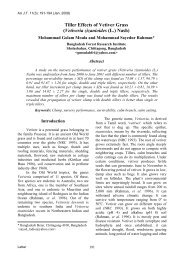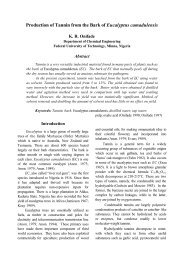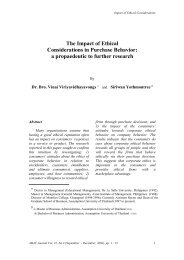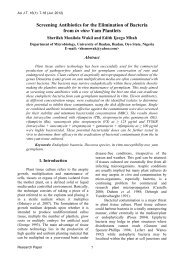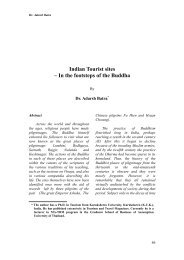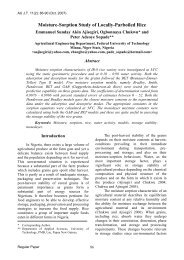Impact of Service Quality, Trust, and Customer ... - AU Journal
Impact of Service Quality, Trust, and Customer ... - AU Journal
Impact of Service Quality, Trust, and Customer ... - AU Journal
Create successful ePaper yourself
Turn your PDF publications into a flip-book with our unique Google optimized e-Paper software.
Mohammad Muzahid Akbar <strong>and</strong> Noorjahan Parvez<br />
Discussion<br />
The present study is noteworthy for a<br />
special reason. As to the knowledge <strong>of</strong> the<br />
researchers no such study has been done<br />
previously on the subscribers <strong>of</strong> any telecommunication<br />
company in Bangladesh to<br />
examine whether customers’ perceived service<br />
quality, trust, <strong>and</strong> customer satisfaction<br />
can engender customer loyalty. Specially, the<br />
researchers have tried to investigate whether<br />
the postulated causal relationships among<br />
the studied variables vary in two measurement<br />
models for the same group <strong>of</strong> subscribers.<br />
Researchers hope that such study might<br />
induce the mobile service providers to calk<br />
out appropriate course <strong>of</strong> action to create a<br />
loyal customer base by ensuring judicious<br />
use <strong>of</strong> valuable marketing resources. Data<br />
supported the proposed model 2, where<br />
direct paths from customers’ perceived service<br />
quality <strong>and</strong> trust to customer loyalty;<br />
<strong>and</strong> indirect paths from customers’ perceived<br />
service quality to customer loyalty as mediated<br />
through customer satisfaction have<br />
been examined.<br />
In general, the results have supported<br />
most <strong>of</strong> the hypothesized relationships.<br />
<strong>Customer</strong> satisfaction performs an important<br />
mediating role between service<br />
quality <strong>and</strong> customer loyalty is supported<br />
by this research. Hence, the management<br />
should primarily focus on customer satisfaction<br />
for which service quality is an<br />
important antecedent. Because the impact<br />
<strong>of</strong> perceived service quality on preference<br />
loyalty is considerably strong<br />
leading to a more favorable disposition<br />
towards the service provider <strong>and</strong> increased<br />
commitment to re-patronize.<br />
<strong>Customer</strong> satisfaction alone can not<br />
34<br />
achieve the objective <strong>of</strong> creating a loyal customer<br />
base. In both models trust has come<br />
out to be an important antecedent <strong>of</strong> customer<br />
loyalty. While determining the imperatives<br />
<strong>of</strong> ‘how to win customers’ trust’ the<br />
service provider(s) must focus on both<br />
present <strong>and</strong> future time frame. The construct<br />
<strong>of</strong> trust contains belief in the br<strong>and</strong> or company,<br />
which provides the customers an assurance<br />
<strong>of</strong> positive outcomes not only for<br />
the present but also for the future. As illustrated<br />
in the literature, the customers must<br />
be led to believe that the company will not<br />
behave opportunistically for sake <strong>of</strong> its own<br />
interest; otherwise they will switch their allegiance.<br />
The findings <strong>of</strong> this study have to be interpreted<br />
considering few limitations.<br />
First, data were collected only from the<br />
subscribers <strong>of</strong> one private telecommunication<br />
company; so the results might not<br />
hold true for other telecommunication<br />
companies. Second, data collection was<br />
is limited to the subscribers <strong>of</strong> that private<br />
telecommunication company who<br />
live in Dhaka metropolitan area; so the<br />
findings should not be generalized for all<br />
the subscribers <strong>of</strong> the entire country.<br />
Third, the current study was a cross-sectional<br />
study but to determine the causal<br />
paths <strong>of</strong> the studied variables a longitudinal<br />
study would have been more appropriate<br />
(Poon, 2004). In addition, the<br />
current study not being an experimental<br />
one it was not possible to eliminate or<br />
withhold the influence <strong>of</strong> unidentified<br />
<strong>and</strong> undesired extraneous variables from<br />
the study. Hence, future researchers<br />
might consider the recommended studies to<br />
draw causal inferences more confidently <strong>and</strong><br />
safely. Finally, theoretically other variables



